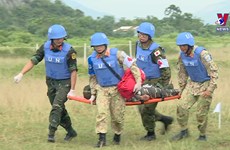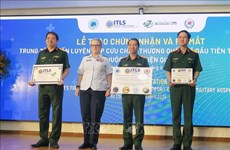USAID project helps combat spread of diseases
A US Agency for International Development (USAID) project has helped c
entral and provincial health and agriculture authorities, and
organisations in Vietnam adopt effective and affordable models aiming at
reducing the risk of avian influenza and other emerging infectious
diseases in animals and humans.
A US Agency for International Development (USAID) project has helped c
entral and provincial health and agriculture authorities, and
organisations in Vietnam adopt effective and affordable models aiming at
reducing the risk of avian influenza and other emerging infectious
diseases in animals and humans.
This is the outcome of the USAID’s Avian and Pandemic Influenza Initiative after four years of implementation, which was announced at a conference in Hanoi on August 6.
These models address separation of live poultry in public markets, biosecurity training for poultry farmers through the agricultural extension system and improved safety in small-scale and centralised poultry slaughtering facilities.
They also cover veterinary inspection of poultry products, provincial pandemic preparedness planning and strengthened surveillance of human and animal diseases at the community level.
As of July 2013, 37 provinces have prepared training plans to deliver this training programme to healthcare workers in provincial and district public and private healthcare facilities.
Twenty medical and nursing schools have also adopted the training programme. In line with the National Action Plan on Strengthening Infection Control in Health Care Facilities to 2015 adopted by the Vietnamese Ministry of Health in March, more than 17,000 healthcare workers will complete the training programme in the coming two years.-VNA
This is the outcome of the USAID’s Avian and Pandemic Influenza Initiative after four years of implementation, which was announced at a conference in Hanoi on August 6.
These models address separation of live poultry in public markets, biosecurity training for poultry farmers through the agricultural extension system and improved safety in small-scale and centralised poultry slaughtering facilities.
They also cover veterinary inspection of poultry products, provincial pandemic preparedness planning and strengthened surveillance of human and animal diseases at the community level.
As of July 2013, 37 provinces have prepared training plans to deliver this training programme to healthcare workers in provincial and district public and private healthcare facilities.
Twenty medical and nursing schools have also adopted the training programme. In line with the National Action Plan on Strengthening Infection Control in Health Care Facilities to 2015 adopted by the Vietnamese Ministry of Health in March, more than 17,000 healthcare workers will complete the training programme in the coming two years.-VNA













